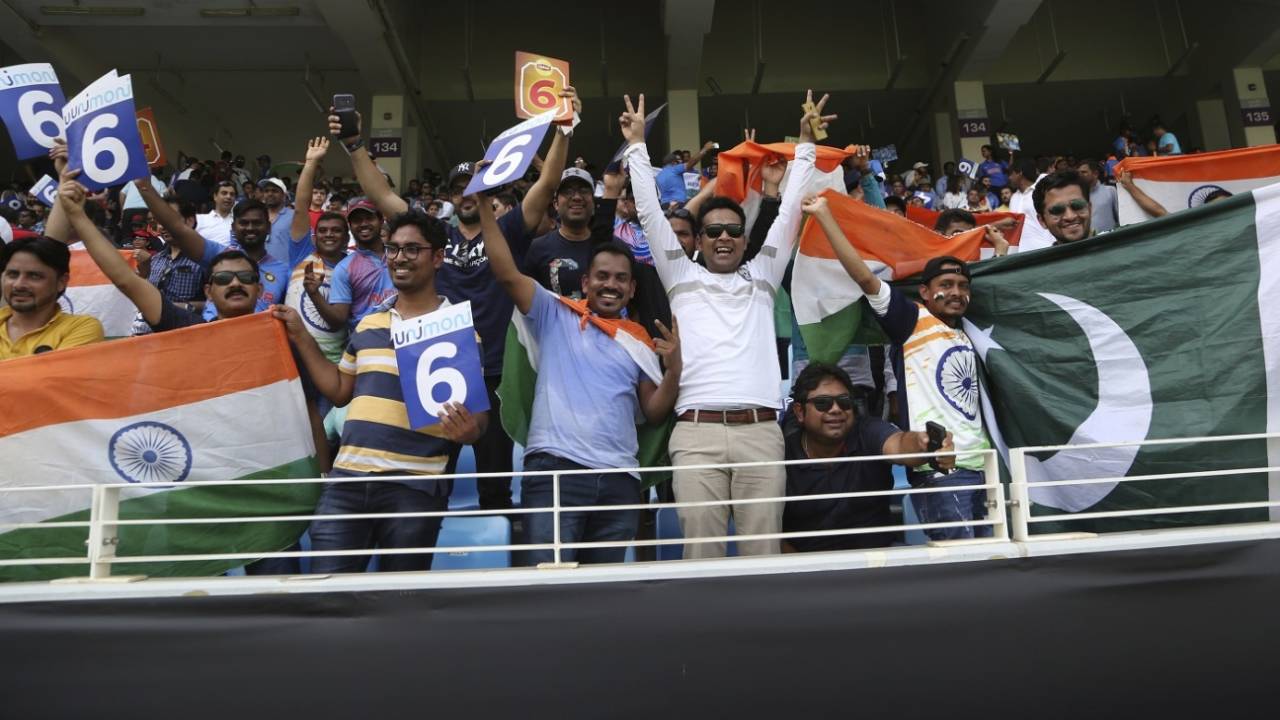BCCI, PCB brace for 'landmark' dispute panel judgment
Officials expect the three-member panel, which finished proceedings on Wednesday, to deliver a verdict with an impact that goes beyond cricket
Nagraj Gollapudi and Osman Samiuddin
Oct 4, 2018, 1:03 PM
India and Pakistan fans revel before the first ball • Associated Press
The ICC panel hearing a dispute between the PCB and BCCI could potentially deliver a "landmark" judgment with reverberations for all intersections between sports and politics.
A three-person dispute panel, set up to arbitrate the PCB's claims for monetary compensation for two bilateral tours the BCCI didn't honour, finished proceedings in Dubai on Wednesday.
There is no indication when the panel, headed by Michael Beloff QC and including legal heavyweights Jan Paulsson and Dr Annabelle Bennett, will return a verdict though it is not unusual in such cases for it to take anywhere between four and six weeks.
Lawyers from both sides presented their cases over three days that began in what was described as a "tense" and "formal" atmosphere and which remained "intense" throughout. A couple of officials likened it to the tension of an India-Pakistan limited-overs encounter.
The dispute centers around an agreement the two boards signed in 2014 to play six series over eight years between 2015 and 2023. That agreement was the price the BCCI paid for the PCB's approval of the Big Three governance changes; those changes were first voted in before being reversed.
The PCB is claiming compensation of USD 63 million for two series it was supposed to host in November 2014 and December 2015 as per the agreement, but which eventually did not take place.
The primary reason for the BCCI's refusal to tour is political. Ties between the two countries have been strained since the 2008 Mumbai terror attacks and BCCI officials have made it clear that the decision to tour ultimately hinges on the Indian Prime Minister's office.
To that end, the appearance of the most high-profile witness at the arbitration, Salman Khurshid, India's foreign minister at the time the agreement was signed.
Officials and witnesses are under strict instructions to not talk publicly about the proceedings but Khurshid explained to the panel that it was "beyond the control" of cricket boards to organise a bilateral series in the troublesome prism of India-Pakistan relations.
"I gave my expert evidence to the ICC panel and explained how the Indian government reacts to situations where security of people are under threat," Khurshid told the Hindustan Times. "Fortunately, when I was minister we didn't have to deal with such (crisis) issues but irrespective of governments, I could express how one would react to fulfilling obligations that's beyond the control of cricket boards."

ESPNcricinfo Ltd
The BCCI also argued that the agreement was a letter of intent that would only become a binding agreement once government permission had been granted. The PCB's counter was that under English law it suffices as an agreement.
Khurshid was one of five witnesses the BCCI called up. Among the others were Sanjay Patel, the board secretary and signatory to the agreement, Sundar Raman, a key figure in the ICC revamp, and Ratnakar Shetty, the BCCI administrative head who was a conduit between the board and government.
Also appearing was Shashank Manohar, the ICC chairman who was BCCI president in 2015 when one of the series was scheduled (Manohar, in fact, had shown an inclination to play the series subject to government approval). His appearance as a BCCI witness while ICC chairman raised eyebrows - the PCB was unhappy with his role as a mediator in one of the good-faith meetings the boards had before this panel was set up. Conspicuous by their absence, however, were N Srinivasan, the BCCI president at the time of the agreement, and the then secretary Anurag Thakur. None of the witnesses were current BCCI officials.
The PCB, in contrast, called upon just Najam Sethi, their board chairman at the time, and Subhan Ahmed, the chief operating officer. At least to PCB eyes that witness count is illustrative of the two approaches to the case: the PCB simplifying and focusing on what it believes matters most - the agreement letter - and the BCCI going beyond that and into the circumstances in which it was created and under which it could operate.
Only two outcomes are now possible - that the PCB wins its claim or it doesn't. The panel cannot force the lost series to be rescheduled. But as much as the money, both boards - and the ICC - will be relieved to receive some long overdue clarity on cricket's most compelling but presently moribund rivalry.
The pair are not going to meet in Test cricket's new showpiece event, the two-year Test Championship starting next year. They are not scheduled to meet in the following two-year cycle either, or in the concurrent ODI league. That confines the rivalry to ICC limited-overs events and other multilateral tournaments such as the Asia Cup for the foreseeable future.
Written closing arguments now have to be submitted to the panel within a week, into which new arguments could be introduced based on the evidence presented over the last three days.
Officials expect the decision to have an impact beyond cricket. The issues at play - of government involvement, of the sport being used as a tool for diplomacy but also being held hostage to politics - resonates in several other sports. Any decision here - reached by a heavyweight panel with accomplished legal minds - could be used hereon as a precedent in other sports where geopolitics cannot help but get entangled.
Osman Samiuddin is a senior editor at ESPNcricinfo
